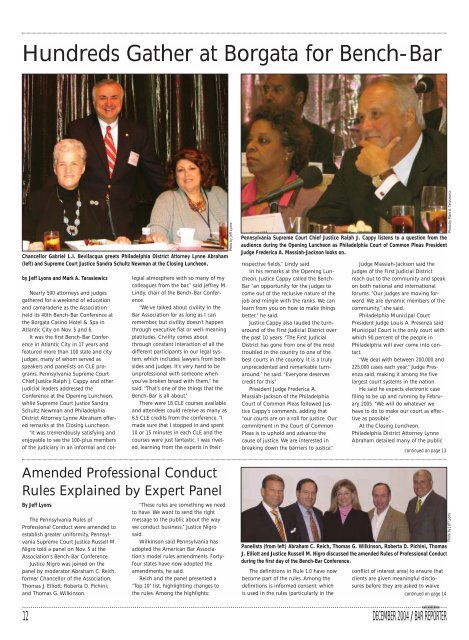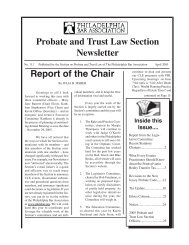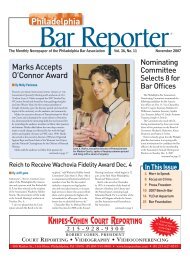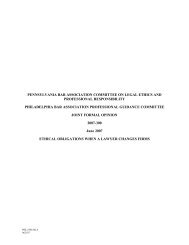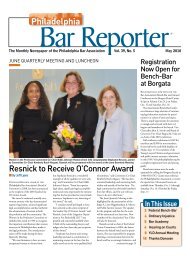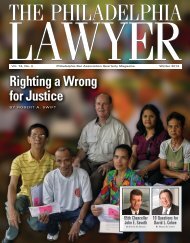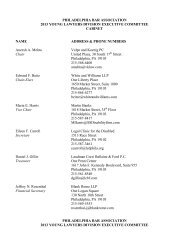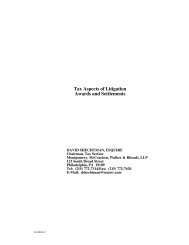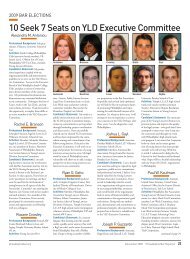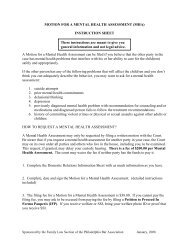December 2004 - Vol. 33, No. 12 - Philadelphia Bar Association
December 2004 - Vol. 33, No. 12 - Philadelphia Bar Association
December 2004 - Vol. 33, No. 12 - Philadelphia Bar Association
You also want an ePaper? Increase the reach of your titles
YUMPU automatically turns print PDFs into web optimized ePapers that Google loves.
Hundreds Gather at Borgata for Bench-<strong>Bar</strong><br />
Chancellor Gabriel L.I. Bevilacqua greets <strong>Philadelphia</strong> District Attorney Lynne Abraham<br />
(left) and Supreme Court Justice Sandra Schultz Newman at the Closing Luncheon.<br />
by Jeff Lyons and Mark A. Tarasiewicz<br />
Nearly 500 attorneys and judges<br />
gathered for a weekend of education<br />
and camaraderie as the <strong>Association</strong><br />
held its 40th Bench-<strong>Bar</strong> Conference at<br />
the Borgata Casino Hotel & Spa in<br />
Atlantic City on <strong>No</strong>v. 5 and 6.<br />
It was the first Bench-<strong>Bar</strong> Conference<br />
in Atlantic City in 17 years and<br />
featured more than 100 state and city<br />
judges, many of whom served as<br />
speakers and panelists on CLE programs.<br />
Pennsylvania Supreme Court<br />
Chief Justice Ralph J. Cappy and other<br />
judicial leaders addressed the<br />
Conference at the Opening Luncheon,<br />
while Supreme Court Justice Sandra<br />
Schultz Newman and <strong>Philadelphia</strong><br />
District Attorney Lynne Abraham offered<br />
remarks at the Closing Luncheon.<br />
“It was tremendously satisfying and<br />
enjoyable to see the 100-plus members<br />
of the judiciary in an informal and collegial<br />
atmosphere with so many of my<br />
colleagues from the bar,” said Jeffrey M.<br />
Lindy, chair of the Bench-<strong>Bar</strong> Conference.<br />
“We’ve talked about civility in the<br />
<strong>Bar</strong> <strong>Association</strong> for as long as I can<br />
remember, but civility doesn’t happen<br />
through executive fiat or well-meaning<br />
platitudes. Civility comes about<br />
through constant interaction of all the<br />
different participants in our legal system,<br />
which includes lawyers from both<br />
sides and judges. It’s very hard to be<br />
unprofessional with someone when<br />
you’ve broken bread with them,” he<br />
said. “That’s one of the things that the<br />
Bench-<strong>Bar</strong> is all about.”<br />
There were 18 CLE courses available<br />
and attendees could receive as many as<br />
6.5 CLE credits from the conference. “I<br />
made sure that I stopped in and spent<br />
10 or 15 minutes in each CLE and the<br />
courses were just fantastic. I was riveted,<br />
learning from the experts in their<br />
Photo by Jeff Lyons<br />
Pennsylvania Supreme Court Chief Justice Ralph J. Cappy listens to a question from the<br />
audience during the Opening Luncheon as <strong>Philadelphia</strong> Court of Common Pleas President<br />
Judge Frederica A. Massiah-Jackson looks on.<br />
respective fields,” Lindy said.<br />
In his remarks at the Opening Luncheon,<br />
Justice Cappy called the Bench-<br />
<strong>Bar</strong> “an opportunity for the judges to<br />
come out of the reclusive nature of the<br />
job and mingle with the ranks. We can<br />
learn from you on how to make things<br />
better,” he said.<br />
Justice Cappy also lauded the turnaround<br />
of the First Judicial District over<br />
the past 10 years. “The First Judicial<br />
District has gone from one of the most<br />
troubled in the country to one of the<br />
best courts in the country. It is a truly<br />
unprecedented and remarkable turnaround,”<br />
he said. “Everyone deserves<br />
credit for this.”<br />
President Judge Frederica A.<br />
Massiah-Jackson of the <strong>Philadelphia</strong><br />
Court of Common Pleas followed Justice<br />
Cappy’s comments, adding that<br />
“our courts are on a roll for justice. Our<br />
commitment in the Court of Common<br />
Pleas is to uphold and advance the<br />
cause of justice. We are interested in<br />
breaking down the barriers to justice.”<br />
Judge Massiah-Jackson said the<br />
judges of the First Judicial District<br />
reach out to the community and speak<br />
on both national and international<br />
forums. “Our judges are moving forward.<br />
We are dynamic members of the<br />
community,” she said.<br />
<strong>Philadelphia</strong> Municipal Court<br />
President Judge Louis A. Presenza said<br />
Municipal Court is the only court with<br />
which 90 percent of the people in<br />
<strong>Philadelphia</strong> will ever come into contact.<br />
“We deal with between 200,000 and<br />
225,000 cases each year,” Judge Presenza<br />
said, making it among the five<br />
largest court systems in the nation.<br />
He said he expects electronic case<br />
filing to be up and running by February<br />
2005. “We will do whatever we<br />
have to do to make our court as effective<br />
as possible.”<br />
At the Closing Luncheon,<br />
<strong>Philadelphia</strong> District Attorney Lynne<br />
Abraham detailed many of the public<br />
continued on page 13<br />
Photo by Mark A. Tarasiewicz<br />
Amended Professional Conduct<br />
Rules Explained by Expert Panel<br />
By Jeff Lyons<br />
The Pennsylvania Rules of<br />
Professional Conduct were amended to<br />
establish greater uniformity, Pennsylvania<br />
Supreme Court Justice Russell M.<br />
Nigro told a panel on <strong>No</strong>v. 5 at the<br />
<strong>Association</strong>’s Bench-<strong>Bar</strong> Conference.<br />
Justice Nigro was joined on the<br />
panel by moderator Abraham C. Reich,<br />
former Chancellor of the <strong>Association</strong>;<br />
Thomas J. Elliott; Roberta D. Pichini;<br />
and Thomas G. Wilkinson.<br />
“These rules are something we need<br />
to have. We want to send the right<br />
message to the public about the way<br />
we conduct business,” Justice Nigro<br />
said.<br />
Wilkinson said Pennsylvania has<br />
adopted the American <strong>Bar</strong> <strong>Association</strong>’s<br />
model rules amendments. Fortyfour<br />
states have now adopted the<br />
amendments, he said.<br />
Reich and the panel presented a<br />
“Top 10” list, highlighting changes to<br />
the rules. Among the highlights:<br />
Panelists (from left) Abraham C. Reich, Thomas G. Wilkinson, Roberta D. Pichini, Thomas<br />
J. Elliott and Justice Russell M. Nigro discussed the amended Rules of Professional Conduct<br />
during the first day of the Bench-<strong>Bar</strong> Conference.<br />
The definitions in Rule 1.0 have now<br />
become part of the rules. Among the<br />
definitions is informed consent, which<br />
is used in the rules (particularly in the<br />
conflict of interest area) to ensure that<br />
clients are given meaningful disclosures<br />
before they are asked to waive<br />
continued on page 14<br />
Photo by Jeff Lyons<br />
PHILADELPHIA<br />
<strong>12</strong> DECEMBER <strong>2004</strong> / BAR REPORTER


